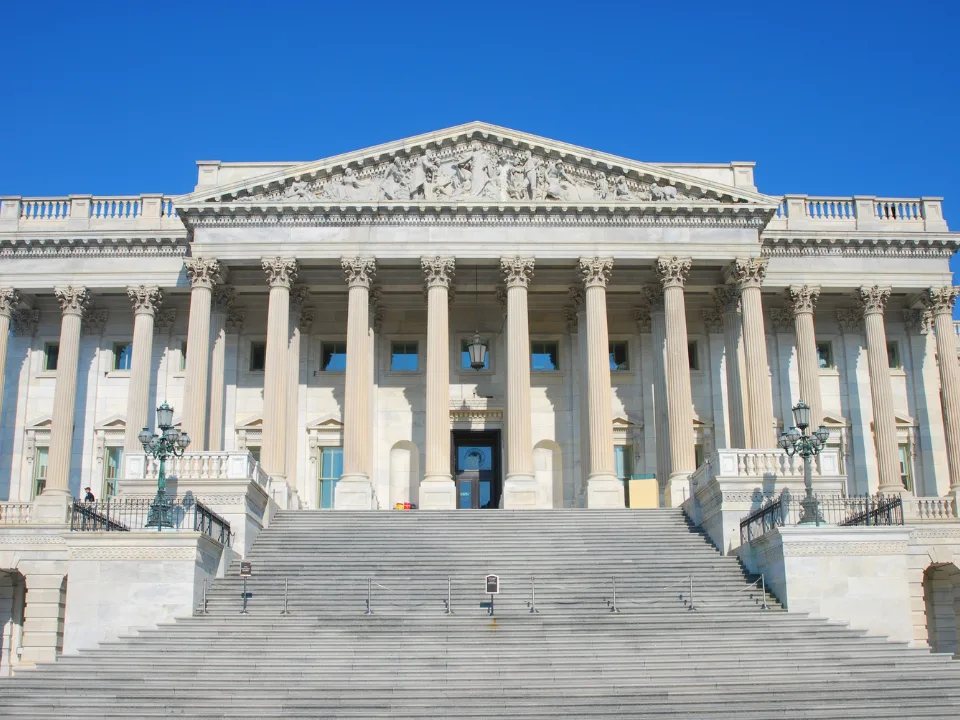- The House voted 218–214 to pass the GOP’s sweeping tax, spending, and policy bill—marking a significant legislative victory for President Trump and House Speaker Mike Johnson.
- The legislation extends Trump-era tax cuts, adds new tax deductions, slashes Medicaid and food aid, boosts military and border spending, and rolls back clean energy incentives from Democrats’ 2022 climate law.
- Minority Leader Hakeem Jeffries delivered a record-breaking nine-hour speech in protest, claiming the bill hurts low-income Americans while benefiting the wealthy.
- The bill adds an estimated $3.4 trillion to deficits over the next decade, per the Congressional Budget Office.
A Second-Term Show of Strength
President Trump set July 4 as the deadline for Congress to deliver a sweeping legislative win—and House Republicans delivered. In a narrow 218–214 vote, they passed the so-called “megabill,” overcoming internal divisions and Democratic resistance, according to the WSJ. The bill now heads to Trump’s desk for signing.
Despite deep reservations among both conservative and moderate Republicans, Speaker Mike Johnson and Trump worked the phones—and social media—through the night to rally support. Vice President JD Vance had already cast the tie-breaking Senate vote earlier this week, 51–50.
Get Smarter about what matters in CRE
Stay ahead of trends in commercial real estate with CRE Daily – the free newsletter delivering everything you need to start your day in just 5-minutes
Inside the Megabill
The bill merges numerous policy priorities into one package:
- Tax Cuts Extended: 2017 tax law provisions, including rate cuts and expanded deductions, are made permanent.
- New Deductions Introduced: Deductions for tipped income, overtime, car-loan interest, and seniors are temporarily added.
- Safety Net Reductions: The bill imposes work requirements and tighter eligibility rules on Medicaid and SNAP (food stamps), cutting billions in assistance.
- Medicaid Changes: New funding restrictions could leave over 11 million people uninsured by 2034, per CBO estimates.
- Military & Border Boost: Hundreds of billions in new spending is allocated to defense and immigration enforcement.
- Clean Energy Rollbacks: Key incentives from the Inflation Reduction Act are weakened, particularly for wind and solar projects.
Historic Floor Speech and Democratic Opposition
House Minority Leader Hakeem Jeffries (D., N.Y.) drew national attention with a 9-hour floor speech—setting a new record. He read stories from constituents who could lose access to healthcare or food aid under the bill, accusing Republicans of harming “everyday Americans” for the benefit of the wealthy.
His speech, which began at 4:53 a.m. and ended just after 1:30 p.m., concluded with Democratic chants of “Ha-keem! Ha-keem!”
GOP Infighting and Concessions
Early opposition from conservatives like Reps. Thomas Massie and Chip Roy nearly derailed the vote. Fiscal hawks had previously insisted on tax cuts not exceeding $2.5 trillion above spending cuts—a threshold the bill overshoots by $500 billion.
Moderates concerned about Medicaid changes also relented after late Senate tweaks, including slower implementation of funding reforms.
Why It Matters
The megabill is the most ambitious legislative package of Trump’s second term so far. Its passage shows the former president’s continued dominance over the GOP and sets the stage for 2026 midterm messaging on taxes, immigration, and spending.
But the price tag—$3.4 trillion added to deficits—could become a flashpoint for both parties heading into campaign season.
What’s Next
With the bill likely to be signed on July 4, attention now turns to implementation. Many of the bill’s provisions roll out gradually, with critical changes to Medicaid and tax policy scheduled for the coming years.
Both Republicans and Democrats are expected to use the megabill as a central talking point in 2026 midterm races—Republicans touting tax relief and Democrats warning of social safety-net cuts.
















